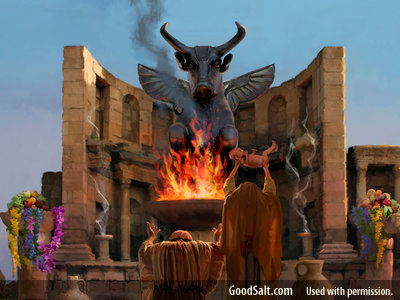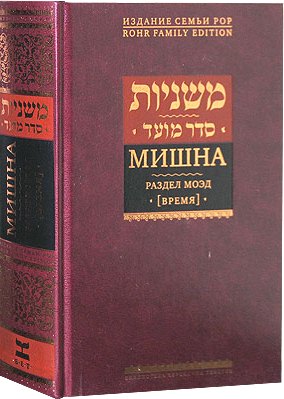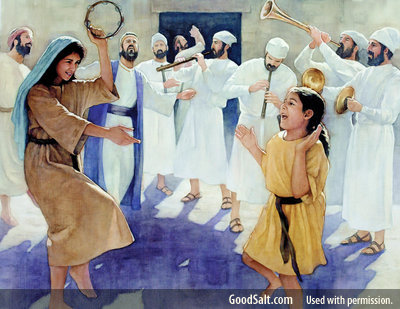(Isaiah 1:14) Does God Hate the Feast Days?
Posted Mar 05, 2025 by Kevin J. Mullins in Questions Concerning Feast Days and Sabbaths
“Your New Moons and your appointed feasts My soul hates; they are a trouble to Me, I am weary of bearing them.” (Isaiah 1:14)
This is yet another example of simply pulling a verse out of its immediate context. The conclusion most people get is that God hates the feast days, so Christians should not be observing them. A good foundation here is to begin at Leviticus chapter 23:
“And the Lord spoke to Moses, saying, 'Speak to the children of Israel, and say to them: The feasts of the Lord, which you shall proclaim to be holy convocations, these are My feasts.’” (Leviticus 23:1-3)
The typical question here is “does God hate His own feasts?” Also, look at the contrast we have in the book of Isaiah above where God says “your appointed feasts My soul hates.” Apparently there’s something that the people are doing during the feasts that is not pleasing to God, and thus they have turned God’s feasts into their own. Let’s go back to Isaiah chapter one and look at the context.
“ ‘To what purpose is the multitude of your sacrifices to Me?’ says the Lord. ‘I have had enough of burnt offerings of rams and the fat of fed cattle. I do not delight in the blood of bulls, or of lambs or goats. When you come to appear before Me, who has required this from your hand, to trample My courts? Bring no more futile sacrifices; incense is an abomination to Me. The New Moons, the Sabbaths, and the calling of assemblies— I cannot endure iniquity and the sacred meeting. Your New Moons and your appointed feasts My soul hates; they are a trouble to Me, I am weary of bearing them.” (Isaiah 1:11-14)
The problem here isn’t the feast days, but the iniquity that is going on during them. According to Numbers 28 and 29 God instructed the people to offer the animal sacrifices during these appointed times (including on the seventh-day Sabbath which is the first feast mentioned in Leviticus 23). But the people had totally misinterpreted the meaning behind these sacrifices. They thought the more sacrifices they offered, the more they could sin, and the more they sinned the more sacrifices were needed to appease God.
“With what shall I come before the Lord, and bow myself before the High God? Shall I come before Him with burnt offerings, with calves a year old? Will the Lord be pleased with thousands of rams, ten thousand rivers of oil? Shall I give my firstborn for my transgression, The fruit of my body for the sin of my soul?” (Micah 6:6, 7)
 This faulty mindset grew among the people to the point they even participated in human sacrifices.
This faulty mindset grew among the people to the point they even participated in human sacrifices.
"Because of all the evil of the children of Israel and of the children of Judah, which they have done to provoke Me to anger, they, their kings, their princes, their priests, and their prophets, and the men of Judah, and the inhabitants of Jerusalem. And they have turned unto Me the back, and not the face: though I taught them, rising up early and teaching them, yet they have not hearkened to receive instruction. But they set their abominations in the house, which is called by My name, to defile it. And they built the high places of Baal, which are in the valley of the son of Hinnom, to cause their sons and their daughters to pass through the fire unto Molech; which I commanded them not, neither came it into My mind, that they should do this abomination, to cause Judah to sin." (Jeremiah 32:32-35)
It is this appeasement mindset, caused by the seed of sin, which has confused us concerning our loving Father, resulting in us forsaking Him, but making it appear that He has forsaken us.
“Alas, sinful nation, a people laden with iniquity, a brood of evildoers, children who are corrupters! They have forsaken the Lord, they have provoked to anger the Holy One of Israel, they have turned away backward … Unless the Lord of hosts had left to us a very small remnant, we would have become like Sodom, We would have been made like Gomorrah … When you spread out your hands, I will hide My eyes from you; even though you make many prayers, I will not hear. Your hands are full of blood. Wash yourselves, make yourselves clean; put away the evil of your doings from before My eyes. Cease to do evil.” (Isaiah 14:4, 9, 15, 16)
Now remember, God ALWAYS hears our prayers, so why does it say He will not hear? This is written as a mirror to reveal what’s in OUR thinking. We believe we must send up prayer after prayer begging for God’s forgiveness as if He is holding some type of grudge or something against us. He doesn’t hear, only because we don’t believe He hears.
“But your iniquities have separated you from your God; and your sins have hidden (clouded) His face from you, so that He will not hear.” (Isaiah 59:2)
Even though our sin deceives us into thinking God has forsaken us, He is still by our side hearing our cry:
“My God, my God, why have You forsaken me? Why are You so far from helping me, and from the words of my groaning? O my God, I cry in the daytime, but You do not hear … You who fear the Lord, praise Him! All you descendants of Jacob, glorify Him, and fear Him, all you offspring of Israel! For He has not despised nor abhorred the affliction of the afflicted; nor has He hidden His face from him; but when he cried to Him, he heard.” (Psalm 22: 1, 2, 23, 24)
 "The LORD is the One who will go before you. He will be with you; He will not leave you or forsake you. Do not be afraid or discouraged.” (Deuteronomy 31:8, Holman Christian Standard Bible)
"The LORD is the One who will go before you. He will be with you; He will not leave you or forsake you. Do not be afraid or discouraged.” (Deuteronomy 31:8, Holman Christian Standard Bible)
"Your life should be free from the love of money. Be satisfied with what you have, for He Himself has said, I will never leave you or forsake you." (Hebrews 13:5, Holman Christian Standard Bible)
The purpose of prayer is not to change God’s mind or attitude towards the sinner. We all need to understand that we do not need to beg and plead for God’s forgiveness. We only need to accept and claim His forgiveness which He so freely gives, as any true loving father would toward his child.
"But Samuel replied, 'What is more pleasing to the LORD: your burnt offerings and sacrifices or your obedience to His voice? Listen! Obedience is better than sacrifice, and submission is better than offering the fat of rams.'" (1 Samuel 15:22, New Living Translation)
The multitude of sacrifices and useless prayers, due to the misunderstandings of fallen man, corrupted God’s feasts. The book of Hebrews brings this out and teaches that, even when this false ideology disappears from our mindset, God’s feasts will remain as holy convocations (assemblies) as at the beginning:
“But in those sacrifices there is a reminder of sins every year. For it is not possible that the blood of bulls and goats could take away sins. Therefore, when He (Christ) came into the world, He said: ‘Sacrifice and offering You (God) did not desire, but a body You have prepared for Me. In burnt offerings and sacrifices for sin You had no pleasure.’ Then I (Christ) said, ‘Behold, I have come—In the volume of the book it is written of Me—To do Your will, O God.’ … He (Christ) takes away the first [the animal sacrifices, see also Daniel 9:27] that He may establish the second [the will of God – our sanctification]. By that will we have been sanctified through the offering of the body of Jesus Christ once for all. … And let us consider one another in order to stir up love and good works, not forsaking the assembling of ourselves together [upon His feast days], as is the manner of some, but exhorting one another, and so much the more as you see the Day approaching.” (Hebrews 10:3-7, 9, 10, 24, 25)1
Christ is in the Heart of the Feasts
God’s feasts were designed for us to enter into His rest and receive double portion blessings of His Spirit (presence). The people had changed this design into their own performance-based legalistic holidays. They would observe these feasts out of obligation (because the Law says so!) and not out of love. They treated God’s Law as arbitrary rules, a legislative code, instead of a Law that is spiritual and built by design into the very fabric of creation (Romans 7:14). However, without God’s Law written in the heart by the indwelling Spirit of Christ, no one is able to submit to its design.
You cannot keep the Sabbath of the Lord, without the Lord of the Sabbath – Jesus (Matthew 12:28). Jesus is the one who created and rested upon the very first Sabbath after creation (Genesis 2:1-3; Colossians 1:12-17). Without Christ there is no Sabbath. A sabbath without Christ is another sabbath. It’s just another day even though it may fall upon the same day as God’s Sabbath. Thus the Jews had “changed” God’s Sabbath into “the Jewish Sabbath” by their rejection of Christ.
 The “Jewish” way of keeping the Sabbath is a yoke of bondage because they have added all sorts of strict ridiculous rules to the Sabbath Command. These added traditions are called Takanot and are still taught and practiced today by Orthodox Jews. There are at least 39 man-made “forbidden works” (called, The 39 Melachot) added to the Sabbath Command. Jesus was in constant disagreement with these man-made traditions (see, Matt. 23), thus rebuking them for not truly keeping the Sabbath day at all even though they were resting from work upon the seventh-day of the week.
The “Jewish” way of keeping the Sabbath is a yoke of bondage because they have added all sorts of strict ridiculous rules to the Sabbath Command. These added traditions are called Takanot and are still taught and practiced today by Orthodox Jews. There are at least 39 man-made “forbidden works” (called, The 39 Melachot) added to the Sabbath Command. Jesus was in constant disagreement with these man-made traditions (see, Matt. 23), thus rebuking them for not truly keeping the Sabbath day at all even though they were resting from work upon the seventh-day of the week.
In the section entitled “Shabbat” in the Jewish Mishna (written in 200 A.D.) is a list of the 39 forbidden works added to the Sabbath commandment. These requirements, quoted from Herbert Dandby’s translation of the Mishna (London, 1933), page 106, are listed below:
“The main classes of work are forty save one: sowing, ploughing, reaping, binding sheaves, threshing, winnowing, cleansing crops, grinding, sifting, kneading, baking, shearing wool, washing or beating or dyeing it, spinning, weaving, making two loops, weaving two threads, tying, loosening, sewing two stitches, tearing in order to sew two stitches, hunting a gazelle, slaughtering or flaying or salting it or curing its skin, scraping it or cutting it up, writing two letters, erasing in order to write two letters, building, pulling down, putting out a fire, lighting a fire, striking with a hammer, and taking out aught from one domain into another.”
There are also many sub-regulations added in order to define the main classes of the 39 Melachot. For example: Objects could not be carried in the usual manner. If you had a handkerchief you could not carry it in your pocket or in your hand. You had to pin it to your clothes as if making it a part of your clothing. An object could, however, be tossed on the Sabbath provided it was tossed in the distance allowed. Nurses could not carry babies around on the Sabbath. It was even debated if the parent could carry his/her own child. These added regulations make the Sabbath a day of gloom.
We Are to Enter Into God’s Spiritual Rest
Scripture tells us:
“For he who has entered His (God’s) rest has himself also ceased from his works as God did from His. Let us therefore be diligent to enter that rest (God’s rest), lest anyone fall according to the same example of disobedience.” (Hebrews 4:10-11)
True Sabbath keeping is entering into “God’s rest”, not our own. God did not rest because He was tired:
“Have you not known? Have you not heard? The everlasting God, the LORD, the Creator of the ends of the earth, neither faints nor is weary. His understanding is unsearchable.” (Isaiah 40:28)
If we are to enter into God’s rest as He rested, then the rest we enter into is not a physical rest, but a spiritual rest. God said of the Sabbath:
“It is a sign between Me and the children of Israel forever; for in six days the LORD made the heavens and the earth, and on the seventh day He rested and was refreshed.” (Exodus 31:17)
The Hebrew word for refreshed here is, נָפַשׁ (naphash), which means, “to breath, or be breathed upon.” Here we see the Son resting in His Father as the Father breathes His refreshing Spirit of life upon Him, just as Jesus breathed this same Spirit on His disciples saying, “Receive the Holy Spirit” (John 20:22). The Holy Spirit is the omnipresence of Jesus:
“If ye love Me (Jesus), keep My Commandments. And I will pray the Father, and He shall give you another Comforter, that He may abide with you for ever … I (Jesus) will not leave you comfortless: I will come to you.” (John 14:15, 16, 18)
“And because you are sons, God has sent forth the Spirit of His Son into your hearts, crying out, ‘Abba, Father!’” (Galatians 4:6)
This is why simply resting on the seventh-day of the week from your own work as a “duty” is not keeping the Sabbath day at all. This type of sabbath is not at all in agreement with “the Sabbath of the Lord” even though they may fall upon the same day of the week. It is simply Saturday-keeping! This is what Jesus was teaching His hearers, calling out to them to repent and enter into “God’s true Sabbath rest” by resting (believing) in His creative works that He so desires to do in man, re-creating us into a new (selfless) creature, and restoring us into His likeness and image.
“God rested and put His spiritual rest upon the day for man, did He? (Yes). God's refreshing, His rejoicing in that day was for man (Mark 2:27). The blessing with which He blessed it was for man. The holiness which His presence brought to it and which His presence gave to it, was for man. His presence sanctifying it was for man. Well then was it not that man through the Sabbath might be a partaker of His presence and be made acquainted by living experience with the spiritual rest of God, the spiritual blessing, the holiness, the presence of God to make holy, the presence of God to sanctify him? Is not that what God intended the Sabbath to bring to man? Well, the man who gets all that in the Sabbath is the man who is a Sabbath-keeper. And he knows it too. He knows it and he is delighted to know it. Now another thing: Who was the real present agent in creating? (Christ). Who was it that rested? (Christ). Who was refreshed? (Christ). Who blessed? (Christ). Whose presence made it holy? (Christ's). Whose presence is in the day? (Christ's). Then the man whom the presence of Jesus Christ does not sanctify, and does not make holy and does not bless and to whom it does not bring rest, why, he can't keep the Sabbath. Don't you see, it is only with Christ in the man that the Sabbath can be kept; because the Sabbath brings and has in it the presence of Christ.” (A.T. Jones GCB Sermon 20, 1893)
It is only Christ’s Presence that can make a thing holy. But the religious leaders of the day rejected Him and falsely accused Him of breaking the “Sabbath of the LORD”, when He was only breaking “the Jewish sabbath” and, because they were possessed with the spirit of Satan, they conspired to kill Him (Matthew 12:9-13; Mark 3:2-6; John 5:16-18).
“Do you see the difference? The Jewish Sabbath falls on the same day of the week as the Sabbath of the Lord, but it is not by any means the same thing. It represents only the man himself, and his own work. Instead of being the sign of justification by faith in the work of the Lord (Jesus), it is the sign of self-righteousness, as indicated by the question which the Jews asked of Jesus: ‘What shall we do, that we might work the works of God?’ John 6:28. They counted their own works equal to God's works. Their obedience was not the obedience of faith, but only of form. From such a Sabbath may the Lord deliver us. It is from it that we are delivered in the Sabbath of the Lord, for we are saved from (not, by) our own works, and given the perfect works of the Lord. ‘The seventh day is the Sabbath of the Lord,’ but let us beware of making it a mere caricature of rest. Let us take it for what it is: the rest of the Lord (Jesus).” (E.J. Waggonner, The Three Sabbaths)
Can you see now why God said He was not happy with their New moons and appointed feasts? God “cannot endure iniquity and the sacred meeting.” Paul also speaks of this concept where, in 1 Corinthians chapter 5, he counsels his brethren on their behavior during the Passover festival:
“Your glorying is not good. Do you not know that a little leaven leavens the whole lump? Therefore purge out the old leaven, that you may be a new lump, since you truly are unleavened. For indeed Christ, our Passover, was sacrificed for us. Therefore let us keep the feast, not with old leaven, nor with the leaven of malice and wickedness, but with the unleavened bread of sincerity and truth.” (1 Corinthians 5:6-8)
There would be no need for Paul to correct their behavior during the Passover season if the Passover was not to be observed by Christians. The problem here isn’t the festival of Passover, but what’s being taught and done during the festival!
We Are to Restore God’s Feasts
After Isaiah speaks of God’s displeasure of their feasts, he writes this in chapter 58:
“… If you take away the yoke from your midst, the pointing of the finger, and speaking wickedness, if you extend your soul to the hungry and satisfy the afflicted soul, then your light shall dawn in the darkness, and your darkness shall be as the noonday … Those from among you shall build the old waste places; you shall raise up the foundations of many generations; and you shall be called the Repairer of the Breach, The Restorer of Streets to Dwell In. If you turn away your foot from the Sabbath (stop trampling upon it), from doing your pleasure on My holy day, and call the Sabbath a delight, the holy day of the Lord (the Lord’s day) honorable, and shall honor Him, not doing your own ways, nor finding your own pleasure, nor speaking your own words, then you shall delight yourself in the Lord; and I will cause you to ride on the high hills of the earth, and feed you with the heritage of Jacob your father. The mouth of the Lord has spoken.” (Isaiah 58:9, 10, 12-14)
Clearly, God does not hate His own feast days. He has never wanted to do away with them. Later, in the very last chapter of his book, Isaiah even mentions the keeping of the New Moon and Sabbaths upon the new earth:
 “‘For as the new heavens and the new earth which I will make shall remain before Me,’ says the Lord, ‘So shall your descendants and your name remain. And it shall come to pass that from one New Moon to another, and from one Sabbath to another, all flesh shall come to worship before Me,’ says the Lord.” (Isaiah 66:22, 23)
“‘For as the new heavens and the new earth which I will make shall remain before Me,’ says the Lord, ‘So shall your descendants and your name remain. And it shall come to pass that from one New Moon to another, and from one Sabbath to another, all flesh shall come to worship before Me,’ says the Lord.” (Isaiah 66:22, 23)
I pray that you have come to realize that God does not hate His New Moons and Sabbaths, nor any of His appointed times. The displeasure He feels is when His sacred times are filled with iniquity due to fallen man’s preconceived ideas. If God finds so much displeasure with iniquity within the sacred meeting, just image how sad He feels when we try to replace His holy days with our own man-made holidays!
“The Sunday Sabbath however is something entirely different from the Sabbath of the Jews, and infinitely different from the Sabbath of the Lord. The Sabbath of the Lord is the acceptance of God’s own works, and rest in them alone, allowing Him to work both to will and to do of His good pleasure (Philippians 2:13). The Jewish Sabbath represents the vain attempt of zealous and self-confident humanity to do the works which God Himself does, and which God alone can do. The Sunday Sabbath signifies the substitution of our work for God’s work, as being not only as good, but even better. It dispenses with the form of the commandment of the Lord. The Sunday Sabbath, therefore, stands as the sign of humanity’s pretended power to make things holy.” (E.J. Waggoner, The Three Sabbaths)
1 For a deeper understanding on the true meaning of the animal sacrifices, see the article entitled: Why Did God Institute Animal Sacrifices?
For more information regarding the blessings we receive from observing God's appointed times see the book entitled: Fountain of Blessing